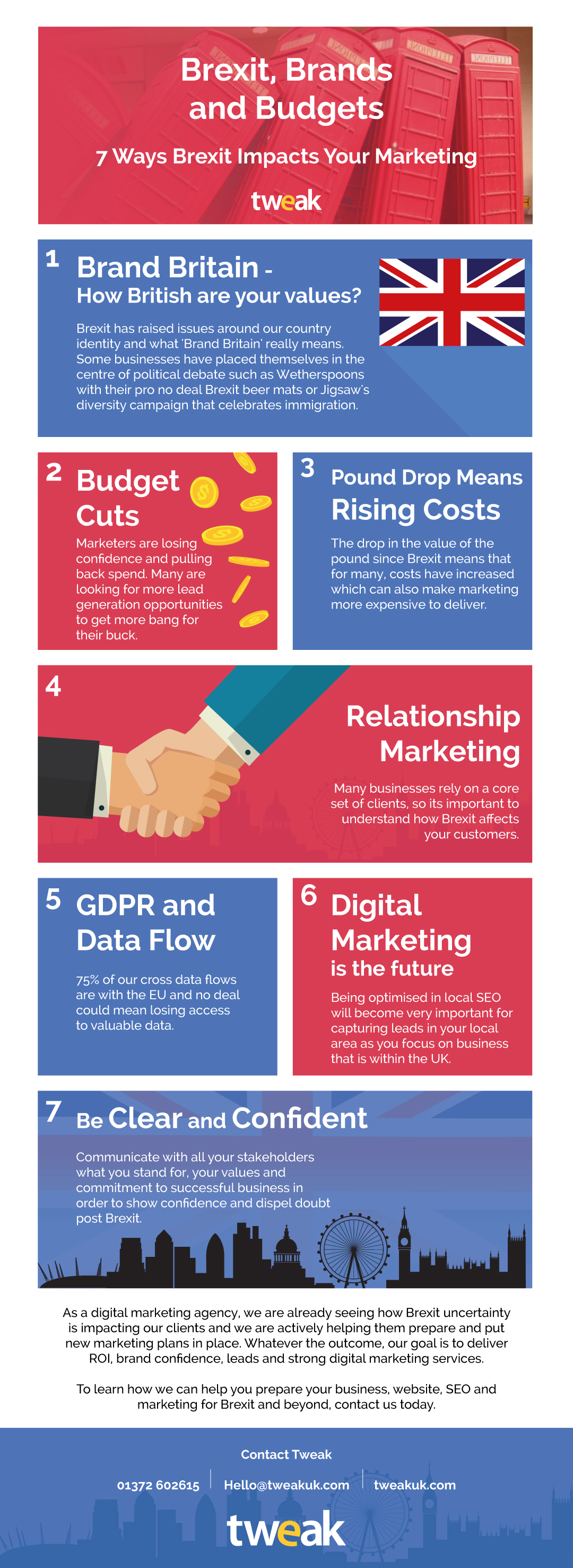
With all the delays, uncertainty and chaos that continues to surround Brexit, marketing departments are feeling the repercussions. It’s affecting budgets, business confidence and is impacting on future revenue streams. Yet, despite the importance of marketing and the effect of Brexit, a survey by Econsultancy recently found that just 10% of respondents have implemented a Brexit marketing strategy.
As a digital marketing agency, we are seeing the impact of Brexit on our clients. Here are some of the ways that we have seen how Brexit is affecting businesses
1. ‘Brand Britain’ – how British are your values?
Confidence in UK has been hit by Brexit and many companies are setting up abroad and distancing themselves. However other brands are using it as an opportunity to reinforce their british-ness. Brexit has raised issues around our countries identity and what ‘Brand Britain’ really means. Many researchers see ‘britishness’ as a paradox – we are formal but funny, traditional but transgressive and polite but profane. Many brands are focusing on traditional values, whilst also pushing diversity. Some businesses have placed themselves in the centre of political debate such as Wetherspoons with their pro no deal Brexit beer matts, or Jigsaw’s diversity campaign that celebrates immigration.
2. Budget Cuts
The IPA’s long-running Bellwether report shows that after 6 years of growth, marketing budgets have in recent years seen more cuts. Uncertainty has put consumer confidence at a low which means they are spending less. Marketers are also losing confidence in the British economy and pulling back spend. Which so much focus on spend levels, marketers are looking for more lead generation, and ways to get more bang for their buck.
3. Pound Drop and Rising Costs
The drop in the value of the pound since Brexit means that for many costs have increased. There are many marketing tools that are based in the US, such as Mailchimp and Adobe which means that the exchange rate between dollars and pounds can be important to the difference in monthly charges. Costs in the supply chain have also seen an increase which can also make marketing more expensive to deliver.
4. Relationship Marketing
Many businesses rely on a core set of clients, so an important strategy is to understand how Brexit affects your major clients and their customers. As part of your marketing, make sure you communicate with clients that you understand the impact of Brexit on them and reflect this in your marketing.
5. GDPR and Data Flow
Brexit will affect the free flow of information with the EU. 75% of our cross data flows are with the EU and no deal could mean losing access to valuable data. Understanding your cross border data flows is important in making sure you are planning ahead.
6. Digital Marketing Presence
Brexit is still to be defined, so we still don’t know what it means for trading. However it could lead to companies being denied opportunities to access international markets and the same can be said of international competitors accessing the UK market. Being optimised in Local SEO will become very important in capturing leads the your local area as you focus on business that is within the UK.
7. Be Clear and Confident
There is a clear role for brand marketing to create a consistent and confident brand message. Communicate with all your stakeholders what you stand for, your value and commitment to successful business. This will help dispel doubt and show confidence in your business post Brexit.
The Future Of Your Marketing
With all the unrest and uncertainty surrounding Brexit this is time when marketing can help companies create a positive path forward. Marketeers have a big role to play in building customer confidence, providing a clear brand message and understanding the changing needs of the market.
As you start planning for 2020 there are many things to start considering including Brexit and changing consumer attitudes. Don’t ignore Brexit until we have a clear idea of what it will be, its important to start now and make sure you stay ahead.
